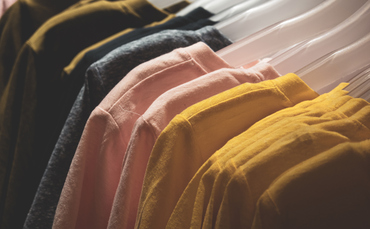Almost half of used textiles are being thrown into rubbish bins, according to a new study which sets out how fast fashion and the ‘throwaway culture’ it fuels is damaging both the environment and the second-hand clothing market.
The report, published this morning by waste charity WRAP, estimates that 49 per cent of used textiles and being thrown out, with each person putting 35 items into general waste streams each year.
While the amount of textile products bought in the UK slumped between 2019 and 2020, demand has now crept back up to near pre-Covid levels, the charity said, serving to cement the UK’s position as the market that consumes more clothes per head than any other country in Europe.
“We’re all buying too many new items and then putting too many clothes in the waste-bin consigning them to landfill or incineration,” said Harriet Lamb, CEO of WRAP. “These are valuable resources, not waste. We should be giving to charity shops who rely on the income, selling on e-commerce, repairing or sharing – anything but the bin.”
The report also warns the textiles that do get donated for re-use have plummeted in price due to the saturation of low-quality fast fashion on the market, resulting in less income for the UK’s textile reuse and recycling sector.
WRAP has warned the value recovered textiles has almost halved over the last decade, falling from £406 and £432 per tonne in 2013 for textile banks and charities, respectively, to £172.50 and £255 per tonne now. The price drop is primarily due to the high volume of lower quality clothing, WRAP said.
Lamb has called for greater support for the textile recycling sector. “Our reports show that fast fashion and low-quality clothing are flooding the market, strangling efforts to make our clothing more sustainable,” she said. “In the end, we are paying a heavy price for our addiction to cheap clothes. The waste, recycling and reuse sectors are under immense pressure.”
Alan Wheeler, CEO at the Textiles Recycling Association, said the global used textile industry was in “a dire situation”.
“Warehouses are full, collections are grinding to a halt, demand in the main global markets is being hugely disrupted, trade has dropped off a cliff, and news of layoffs and rumours of closures are a daily occurrence,” he said. “This current situation coupled with the findings of the new Textiles Market Situation Report show why we need serious interventions and support from government and industry through policies such as Extended Producer Responsibility, product standards and minimum recycled content in new products.”
WRAP has urged brands, retailers, fashion investors, and governments to support the UK’s textiles reuse and recycling sector through a mix of grants, investment, and legislation so as to catalyse a more circular fashion ecosystem.
Keep up to date with all the latest green business news by signing up to the free Daily and Weekly BusinessGreen Newsletters.











